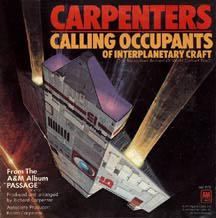| "Calling Occupants of Interplanetary Craft" | ||||
|---|---|---|---|---|
 Side A of the US retail single | ||||
| Single by Klaatu | ||||
| from the album 3:47 EST | ||||
| B-side | "Sub-Rosa Subway" | |||
| Released | 1976 | |||
| Recorded | March 13 – August 1975 [1] | |||
| Studio | Toronto Sound Studios [1] | |||
| Genre | ||||
| Length | 3:23 (single edit) 7:14 (album version) | |||
| Label | Daffodil (Canada) Capitol (rest of the world) | |||
| Songwriter(s) | John Woloschuk, Terry Draper | |||
| Producer(s) | Terry Brown [1] | |||
| Klaatu singles chronology | ||||
| ||||
| Music video | ||||
| "Calling Occupants of Interplanetary Craft" on YouTube | ||||
"Calling Occupants of Interplanetary Craft" is a song by Canadian rock band Klaatu, originally released in 1976 on their first album 3:47 EST . The song was played to open night-time transmission of the pirate radio station Radio Caroline. The year following its release, American soft rock duo the Carpenters covered the song, using a crew of 160 musicians. [5] The Carpenters' version reached the top 10 in the UK and Canada, and charted at number 1 in Ireland.
